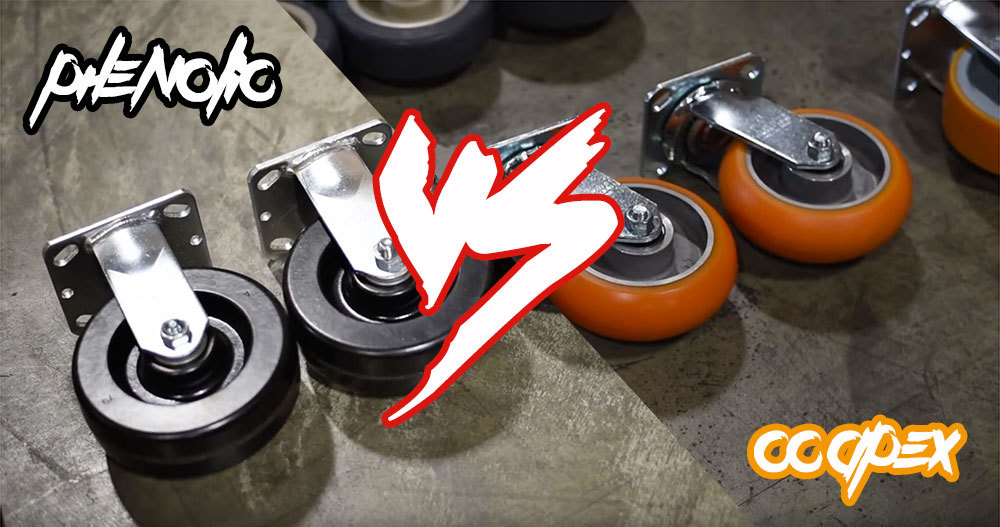Polyurethane or Phenolic Casters: Which is Right for You?

Polyurethane or Phenolic Casters: Which is Right for You?
The reliability of caster wheels directly affects production floor efficiency. Selecting the wrong wheel material for your application can impair performance and lead to frequent replacements, resulting in increased costs. Effective management of your casters is essential to maximize return on investment. Among the most popular options for many applications are phenolic and polyurethane on aluminum wheels, like CC Apex. So how do you know which of these two caster types is best suited for your needs?

Key Considerations for Choosing Caster Wheels
Before selecting a caster wheel, it's essential to evaluate the specific needs of your operation. The right choice can enhance efficiency, reduce maintenance costs, and extend the lifespan of your equipment. When assessing caster wheels, consider these critical factors:

Load Capacity
Ensure the wheels can handle the weight of your equipment without compromising stability.

Floor Surface Protection
The wheel material should minimize damage to your flooring, especially if it’s prone to scratches or wear.

Noise Reduction
Quiet operation may be important for environments where noise levels need to be controlled, such as in healthcare or office settings.

Resistance to Chemicals or Heat
Some materials may degrade when exposed to harsh chemicals or extreme temperatures, so consider the conditions your casters will face.

Cost & Long-Term Durability
While initial costs are important, it's equally crucial to think about the longevity of the wheels and the total cost of ownership.
Now, let’s take a closer look at how phenolic and polyurethane on aluminum wheels measure up in each of these categories.
1. Durability
- Phenolic Wheels: These wheels are known for their strength and can handle heavy loads without deforming. However, they can be prone to cracking or chipping under certain conditions, especially if the floor surface is uneven or has obstacles.
- Polyurethane on Aluminum Wheels: Polyurethane is highly durable and resistant to wear and tear. The aluminum core adds strength, making it ideal for heavy-duty applications. Unlike phenolic wheels, polyurethane doesn’t chip easily and has a longer lifespan.
Winner: Polyurethane on Aluminum — more durable, especially for long-term use.

2. Weight Capacity
- Phenolic Wheels: Thanks to their ability to handle extremely heavy loads, phenolic wheels are suitable for environments where weight is a major concern.
- Polyurethane on Aluminum Wheels: Polyurethane on aluminum wheels are also designed for heavy loads, although their maximum capacity may vary depending on the thickness of the polyurethane layer and the quality of the aluminum core.
Winner: Tie — both are capable of supporting heavy loads, but specific requirements may dictate which is better.

3. Floor Protection
- Phenolic Wheels: Phenolic wheels are hard and rigid, which means they can cause damage to sensitive floor surfaces; therefore, they are best used on smooth, durable floors like concrete.
- Polyurethane on Aluminum Wheels: Softer than phenolic wheels, polyurethane on aluminum wheels provide better traction and are gentler on floors, making them ideal for environments where floor protection is a priority, such as retail stores, warehouses, and distribution centers.
Winner: Polyurethane on Aluminum — safer for a wider range of surfaces.

4. Heat Resistance
- Phenolic Wheels: Phenolic wheels offer excellent heat resistance, as they can handle temperatures up to 300°F, making them ideal for high-heat environments such as bakeries, foundries, and manufacturing plants.
- Polyurethane on Aluminum Wheels:While polyurethane on aluminum wheels are not as heat resistant as phenolic wheels, they can typically withstand temperatures of up to around 180°F, depending on the specific material formulation.
Winner: Phenolic — ideal for high-temperature applications.

5. Noise Reduction
- Phenolic Wheels: Hard and rigid, phenolic wheels can produce more noise during use, especially on hard surfaces.
- Polyurethane on Aluminum Wheels: Polyurethane on aluminum wheels limit noise output due to the polyurethane's softness. The material helps absorb some of the impact, which reduces noise levels.
Winner: Polyurethane on Aluminum — better for noise-sensitive environments.

6. Cost-Effectiveness
- Phenolic Wheels: Phenolic casters are generally more affordable upfront. However, they may need to be replaced more frequently, especially if used in harsh conditions.
- Polyurethane on Aluminum Wheels: While they have a higher upfront cost, the added durability and longer lifespan of polyurethane wheels can lead to lower long-term costs. They represent an investment that pays off over time, particularly in environments that require continuous use.
Winner: Polyurethane on Aluminum — more cost-effective in the long run.

Choosing the Right Caster Wheel
Shop Polyurethane Caster Wheels
8" X 3" CC APEX HD WHEEL w/ TOP HATS
SKU: CCAPEXHD-830-1-1/4
-
- Wheel Width
- 3"
- Wheel Diameter
- 8"
10" X 3" CC APEX HD WHEEL w/ TOP HATS
SKU: CCAPEXHD-1030-3/4
-
- Wheel Width
- 3"
- Wheel Diameter
- 10"
12" X 3" CC APEX HD WHEEL w/ TOP HATS
SKU: CCAPEXHD-1230-3/4
-
- Wheel Width
- 3"
- Wheel Diameter
- 12"
Shop Phenolic Caster Wheels
Looking for a Custom Caster Solution for Your Facility?
Try CC CHAT (Caster Health Assessment Tour), our free consultative service that provides you with actionable solutions for improving your mobility efforts.
